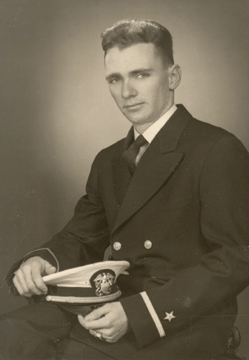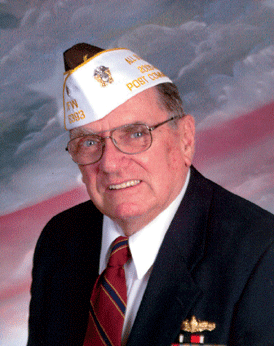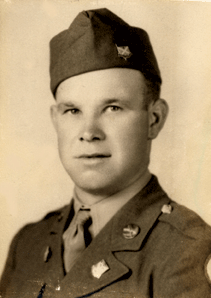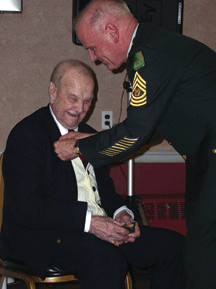Albin A. Rogers
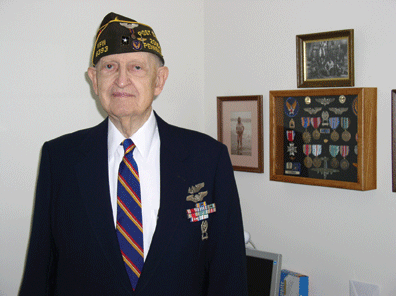
U.S. Army Air Corps Technical Sgt. Albin A. Rogers said bombing the refineries in Europe were the most important of the 35 to 40 missions he flew. (Photo by Petra Chesner Schlatter)
Bucks County resident saw 35-40 air missions
aboard B-24 bombers during World War II.
By Petra Chesner Schlatter
BucksLocalNews.com Editor
U.S. Army Air Corps Technical Sgt. Albin A. Rogers saw 35 to 40 air missions in Europe during World War II. He enlisted at age 19 at Grand Central Terminal, New York City.
Though he trained as a pilot, his job was to “watch the fuel consumption, take care that the engines performed correctly and to make any possible repair to damage that I could to keep the plane flying.”
Rogers was a flight engineer. He said the engineer probably knew more than anybody else on the plane, including the pilot. “He just had to fly it right.”
He flew in B-24s, which were dubbed “The Real American Bomber.” The plane was also called “The Liberator” and was a heavy bomber like a B-17.
Rogers was born in 1923 in Newark, N.J., and grew up in Brooklyn, N.Y. He will celebrate his 85th birthday on June 17. Rogers and his wife, Anna, celebrated their 60th wedding anniversary this year. They have lived in Yardley Borough since 1966.
He is a longtime member of the Knights of Columbus and is an active parishioner at St. Ignatius Roman Catholic Church in Yardley.
Rogers started as a private and advanced to the rank of technical sergeant with five stripes. He was trained on B-17s before he went to B-24s “because they didn’t have any engineers for B-24’s.”
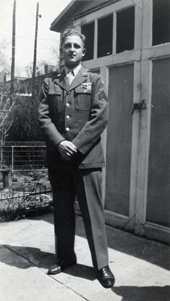 The Tuskegee Airmen, a group of specially trained black men, ‘flew cover.’ “They were fighter pilots. They were very good,” Rogers emphasized.
The Tuskegee Airmen, a group of specially trained black men, ‘flew cover.’ “They were fighter pilots. They were very good,” Rogers emphasized.“Basically, we bombed targets in Austria, Germany, Poland, Czechoslovakia and northern Italy. After Ploesti in Romania —that was after the Ploesti raids — the biggest targets were Vienna and Linz in Austria; Regensburg, Germany; the refineries in Poland, and in northern Germany.
“The worst was Vienna because they had concentrated all their Flak guns as they kept retreating. As they kept retreating, the targets became more dangerous. That’s where we lost more planes to Flak than fighters. Flak is anti-aircraft.
“The biggest gun they had was the 88-mm. That was an 88-mm gun that could be used on ground and air targets. Flak was a German gun — a deadly weapon.”
Rogers said the most important missions were “where we destroyed the refineries because they needed fuel and oil, and we knocked everything out. They had planes, but they couldn’t fly anymore because they didn’t have anymore fuel or any other materials used in flying oil, jet fuel, etc.
“We knocked the refineries out — that was part of the plan between Churchill and Eisenhower: to hit Germany through ‘The Underbelly.’ We hit them from down below. The ones from England came from the north. That’s why they called it ‘The Underbelly of Europe.’”
Beside The Flak, Rodgers said, the next thing that was dangerous was the cold.
“It was like about 60 degrees below zero or colder when you were up 26,000 feet or higher,” he noted.
“The other thing was flying over the Alps was rather dangerous — especially in winter if you had to bail out or something. There was no way you could survive.”
Rogers was in the 484th Bomb Squadron. There were four squadrons in a group.
“We tried to put up a maximum of 48 planes from the group,” hey says. “Each squadron would put up 12 planes for a maximum effort.
“We were part of the 15th Air Force, 49th Wing. We were stationed at Torretta Airfield in Cerignola, Italy. We were part of the 15th Air Force located in Foggia, Italy.”
After more than 40 years, Rogers still keeps his draft card in his wallet. He was more interested in flying rather than being in the infantry.
When asked to talk about the Nazis, Rogers said, “World domination was just a wild dream that Hitler had. The Nazis were a culture of death,” he said.
Today, Rogers is active in the Yardley-Makefield VFW Post 6393 and the Knowles-Doyle American Legion Post 317. With the VFW, he has been a service officer for about 10 years. He has been the local VFW’s chaplain since 2006. He recently became chaplain of the local American Legion.
Labels: Army, World War II, Yardley
 RSS Feeds
RSS Feeds



